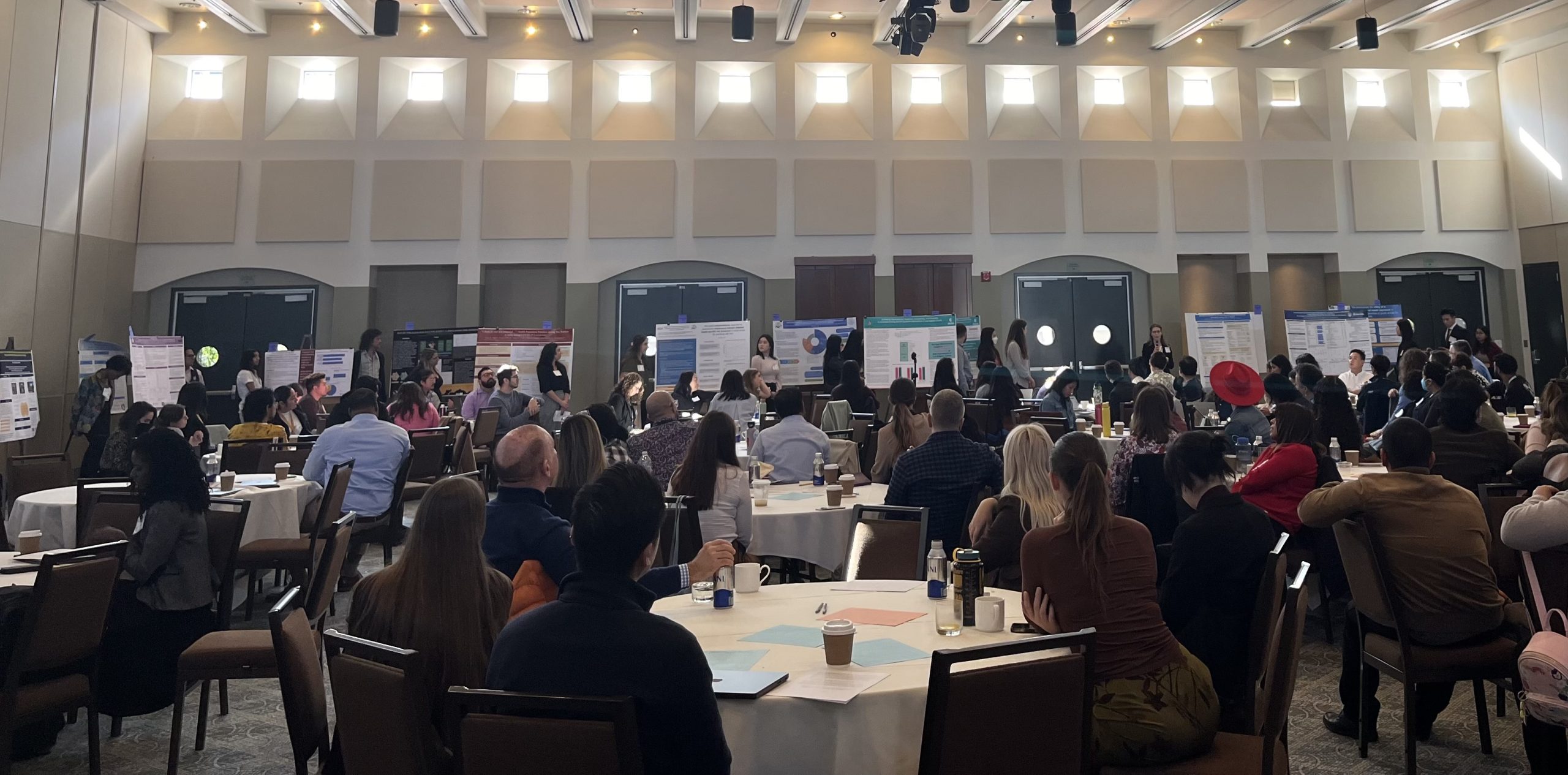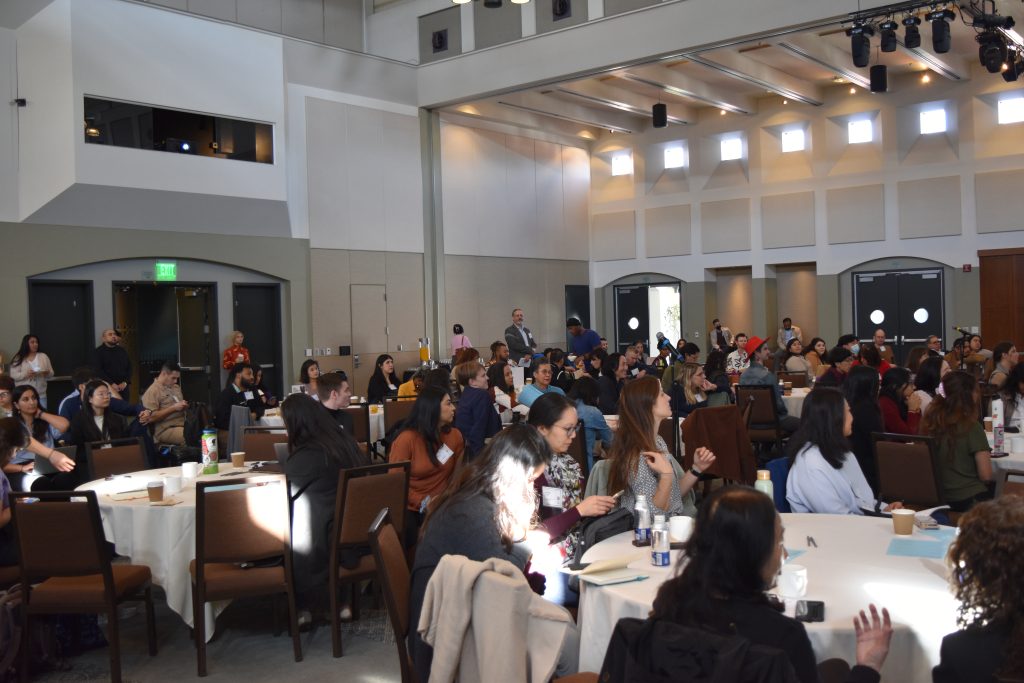 The 2024 CHIPTS HIV Next Generation Conference welcomed over 130 attendees from academic institutions, community-based organizations, health care institutions, and other organizations working to end the HIV epidemic at the UCLA Covel Commons on Friday, January 26, 2024. The conference included engaging oral and poster presentations, discussions, and networking opportunities to support the next generation of HIV researchers and service providers.
The 2024 CHIPTS HIV Next Generation Conference welcomed over 130 attendees from academic institutions, community-based organizations, health care institutions, and other organizations working to end the HIV epidemic at the UCLA Covel Commons on Friday, January 26, 2024. The conference included engaging oral and poster presentations, discussions, and networking opportunities to support the next generation of HIV researchers and service providers.
CHIPTS Development Core Co-Director Dallas Swendeman, PhD, MPH, facilitated this year’s conference and provided a warm welcome to participants. CHIPTS Director Steve Shoptaw, PhD, then shared opening remarks to lay the foundation for an exciting conference, echoing the conference theme by highlighting the importance of developing and scaling up innovative interventions to prevent HIV. Abenaa Jones, PhD, assistant professor at Pennsylvania State University, offered an engaging and insightful opening plenary that explored the syndemic of substance use, HIV, and violence among women involved in the criminal justice system. As part of her presentation, Dr. Jones discussed the development of an all-female, trauma-informed intervention to reduce the incidence and adverse effects of these syndemic issues.
Throughout the day, there were three sets of oral presentations with panel discussions. The first set was moderated by CHIPTS Policy Impact Core Director Nina Harawa, PhD, MPH, and centered on social determinants and HIV. The second set of oral presentations was moderated by CHIPTS Combination Prevention Core Scientist Jesse Clark, MD, and focused on HIV and other health needs. CHIPTS Combination Prevention Core Scientist Ron Brooks, PhD, moderated the last set focused on HIV pre-exposure prophylaxis (PrEP) implementation. The conference also featured a fantastic group of poster presentations highlighting innovative research and evaluation projects to support efforts to end the HIV epidemic.
CHIPTS Development Core Director Norweeta Milburn, PhD, presented the 2024 William E. Cunningham Scholar Award to Danielle Campbell, MPH, a dedicated community organizer and accomplished doctoral student at UC San Diego. Best innovative oral and poster awards were presented to the projects, The Chicago Study for HIV Prevention in Psychiatry: A Mixed-Methods Investigation of Knowledge, Perceived Barriers to Implementation, and Training Needs to Support Pre-Exposure Prophylaxis (PrEP) Prescription by Psychiatrists, and the Pilot Results of Sibling-based Intervention to Promote PrEP to Latinx Sexual Minority Men (poster 3) respectively. To close the conference, Dr. Milburn offered congratulations to the tremendous presenters this year and encouraged participants to continue their commitment to new ideas and collaborations as we work together to end the HIV epidemic.
A complete list of oral presentations, slides, and photo highlights from the conference are provided below.
Check out our photo gallery of the conference on our Facebook page: http://tinyurl.com/24n6cce9
Opening Plenary:
 Abenaa A. Jones, PhD, Ann Atherton Hertzler Early Career Professor in Health and Human Development, Department of Human Development and Family Studies
Abenaa A. Jones, PhD, Ann Atherton Hertzler Early Career Professor in Health and Human Development, Department of Human Development and Family Studies
Presentation Title: Developing Comprehensive Interventions to Address the Syndemic of HIV, Substance Use Disorders, and Violence Among Women Involved in the Criminal Justice System
Presentation Summary: Substance use, HIV and associated risk behaviors, and experiences of violence are prevalent and often inextricably linked among women who use drugs, particularly those involved in the criminal justice system. The presentation will explore the syndemic of substance use, HIV, and violence, along with the development of an all-female and trauma-informed intervention to reduce the incidence and adverse effects of these syndemic issues.
Oral Panel 1 – Social Determinants and HIV:
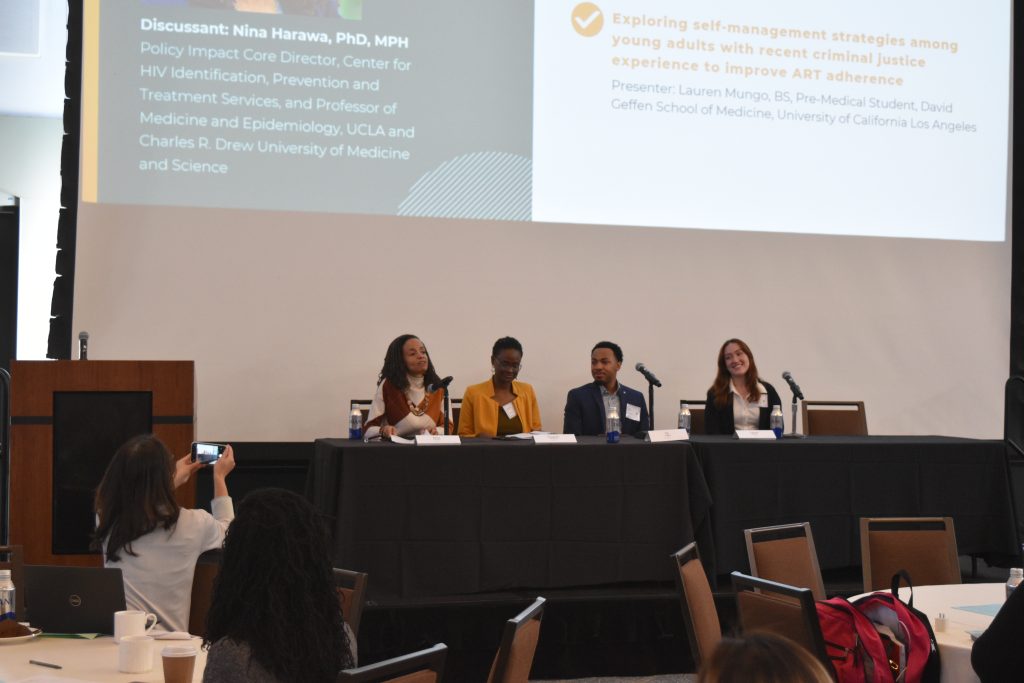
1. Toluwani Adekunle, PhD, Assistant Professor of Public Health, Calvin University (2nd from left)
Presentation Title: A qualitative study of Black and Latine HIV care consumers’ perceptions of providers’ behaviors, medical mistrust, and experiences of discrimination
Presentation Summary: The presentation highlights the experiences of Black and Latine HIV care consumers that foster medical mistrust. These are experiences as pertaining to care consumers’ perceptions of healthcare provider behaviors that invoked feelings of stigma/discrimination, thereby influencing care consumers’ levels of trust and mistrust.
2. Taj Morgan, MPH, Amp Program Manager, Sentient Research (3rd from left)
Presentation Title: Amp: Developing a mobile app using human-centered design to improve the health and well-being of young Black men living with HIV
Presentation Summary: This presentation will describe how we used human-centered design to develop an innovative mobile app to improve HIV care continuum outcomes and overall well-being among young Black gay and bisexual men living with HIV. This process, which involved co-creating the app with end users and HIV service providers, resulted in a program with high feasibility, acceptability, and likely uptake.
3. Lauren Mungo, BS, Pre-Medical Student, David Geffen School of Medicine, University of California Los Angeles (4th from left)
Presentation Title: Exploring self-management strategies among young adults with recent criminal justice experience to improve ART adherence
Presentation Summary: This presentation will discuss a qualitative analysis within the LINK2 study intervention trial regarding the various barriers preventing ART adherence in a population of young adults who have recent criminal justice experience. It will evaluate the effects of self-management strategies in alleviating the daily barriers participants face in taking their medication and its role in fostering positive behaviors that assist in increasing adherence.
Oral Panel 2 – HIV and Other Health Needs:
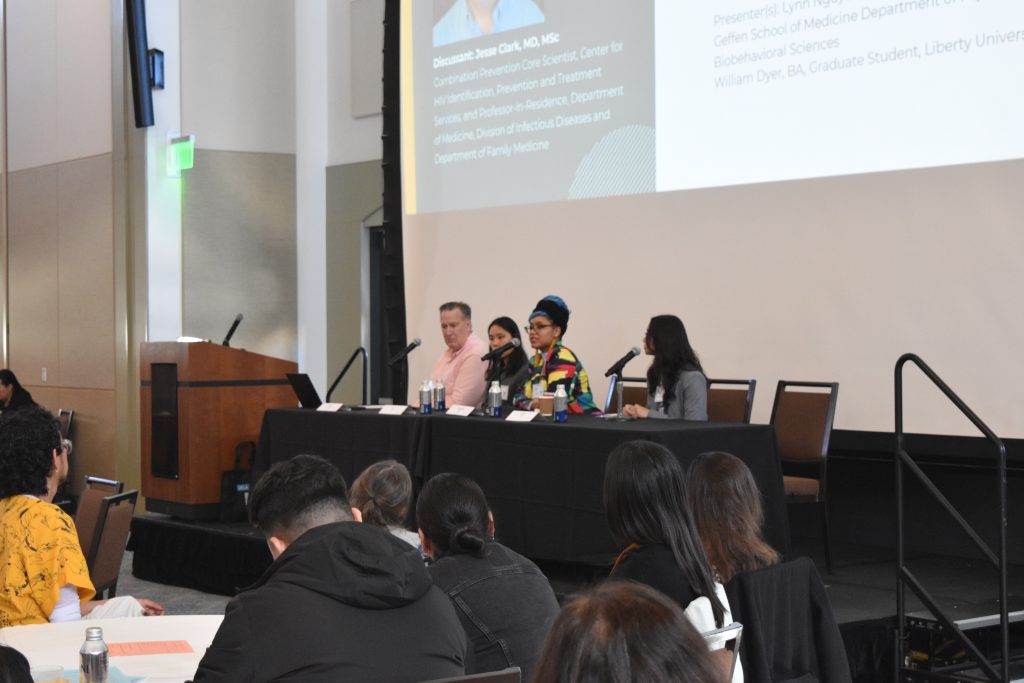
1. Izzy Chiu, BA, Graduate Student, UCLA Department of Epidemiology and Center for Public Health Research, San Francisco Department of Public Health (2nd from left)
Presentation Title: HIV and hepatitis C virus infection and co-infection among trans women in San Francisco, 2020
Presentation Summary: Trans women experience a high burden of HIV and are at high risk for hepatitis C virus (HCV). The interaction between these two diseases and the behavioral risks for HIV/HCV co-infection among trans women are understudied. We present the results of an analysis of HIV and HCV serological and behavioral data collected among trans women in San Francisco from 2019 to 2020 as part of the CDC’s first National HIV Behavioral Surveillance survey for trans women.
2. Khadesia Howell, MPH, MPhil, Graduate Student, RAND Corporation and APLA Health (3rd from left)
Presentation Title: A ‘Think Aloud’ Qualitative Study to Understand Intersectional Stigma and Discrimination Among Black Sexual Minority Men (SMM)
Presentation Summary: This study’s aim is to better understand intersectional stigma and discrimination and its effects on mental health, as well as to improve intersectional stigma assessment tools. It is a qualitative study executed by doing in-depth semi-structured interviews as a way for Black SMM to ‘think aloud’ and tell their stories and experiences. From this we were able to better understand how this marginalized group responds to stigma and discrimination and how they interact with intersectional stigma assessment tools.
3. Lynn Nguyen, BA, Medical Student, UCLA David Geffen School of Medicine Department of Psychiatry and Biobehavioral Sciences (4th from left)
Presentation Title: Unraveling Reproductive and Maternal Health Challenges of Women Living with HIV/AIDS in Vietnam: A Qualitative Study
Presentation Summary: Women living with HIV/AIDS (WLHA) have the additional and unique need to seek sexual and reproductive health services. WLHA’s maternal health journeys can be shaped by the cultural norms and resources that exist in their society. This study sought to understand if and how WLHA’s family planning, pregnancy, and motherhood experiences could be influenced by the patriarchal culture, gender roles, and HIV stigma in Vietnam, specifically.
Oral Panel 3 – PrEP Implementation:
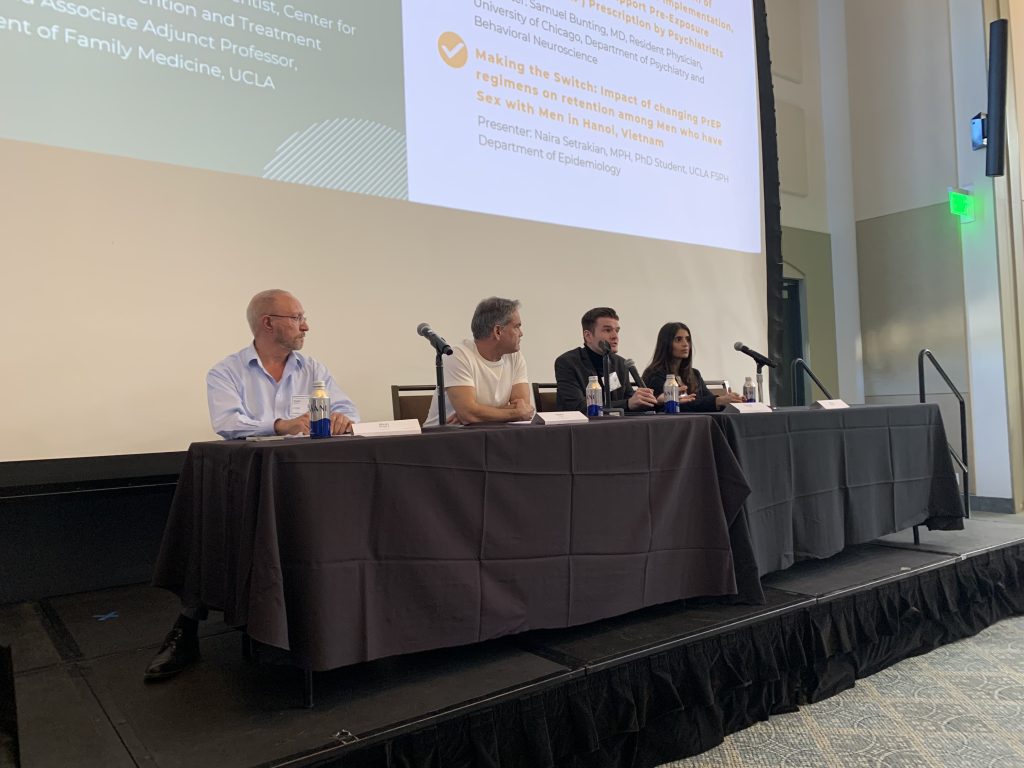
1. Mark Erwin, BA, Director – Strategy, Center for Health Empowerment
Presentation Title: Comparing PrEP retention and prevalent inequities among in clinic and telehealth modalities in Texas
Presentation Summary: Telehealth is often touted as a solution to overcome several PrEP barriers. We explore how PrEP retention compared for clients who accessed it via Telehealth versus In clinic clients. Further, we examined inequities in each group and then compared those inequities with each other.
2. Samuel Bunting, MD, Resident Physician, University of Chicago, Department of Psychiatry and Behavioral Neuroscience
Presentation Summary: Patients living with mental illnesses experience disproportionately high HIV incidence and prevalence, while simultaneously experiencing numerous barriers to care. We conducted a mixed-methods, pilot study of psychiatrists practicing in the EHE priority jurisdictions about integrating PrEP into psychiatric care given the role as primary points of contact with the healthcare system for people with mental illnesses and HIV risk-factors. Psychiatrists practicing in high-HIV incidence areas were largely interested in prescribing PrEP but need additional training with a specific focus on practical management and integration with existing clinical workflows.
3. Naira Setrakian, MPH, PhD Student, UCLA FSPH Department of Epidemiology
Presentation Title: Making the Switch: Impact of changing PrEP regimens on retention among Men who have Sex with Men in Hanoi, Vietnam
Presentation Summary: This presentation will describe patterns of HIV pre-exposure prophylaxis (PrEP) use and switching between event-driven PrEP and daily PrEP regimens in a population of men who have sex (MSM) in Hanoi, Vietnam. Data from a large PrEP clinic at Hanoi Medical University show that switching PrEP regimens is common and results in longer periods of PrEP use.

